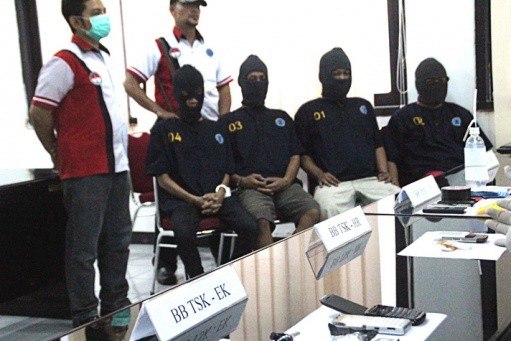Popular Reads
Top Results
Can't find what you're looking for?
View all search resultsPopular Reads
Top Results
Can't find what you're looking for?
View all search resultsUN warns of increased drug trafficking due to AEC integration
The unification of the ASEAN Economic Community (AEC) has made the region more vulnerable to exploitation for profit by drug syndicates. There is already evidence of new routes having been opened up and an increase in narcotics trafficking, according to a recent UN report.
Change text size
Gift Premium Articles
to Anyone
The unification of the ASEAN Economic Community (AEC) has made the region more vulnerable to exploitation for profit by drug syndicates. There is already evidence of new routes having been opened up and an increase in narcotics trafficking, according to a recent UN report.
The country manager of the UN office on drugs and crime (UNODC) in Indonesia, Collie F. Brown, emphasized that traffickers were quick to adapt to new ways of transporting illegal drugs in spite of government attempts to curb such activity.
The report concluded that amphetamine-type stimulants continued to be the greatest drug threat in East and South East Asia.
Brown said the integration of the countries in the region had increased the threat posed by criminal networks that wished to capitalize and exploit the free movement of people and goods. He went on to say that the criminal actions of drug networks were likely to be interrelated with other transnational crimes such as the transporting of illegal migrants.
He emphasized the gravity of the problem, saying that it would not remain isolated in the domestic context but would affect neighboring countries in the region as well.
In combating these issues, Brown called for a "paradigm shift" in government. He stressed the importance of a comprehensive and adequate response, by creating sound policies to address both the attempt to decrease the flow of narcotics as well as to increase rehabilitation. One without the other is less effective, he added.
"This is serious business and unless we respond with commitment, we will fall a step behind," Brown said during a press conference in Jakarta, held to launch the annual International Narcotics Control Board (INCB) report.
Furthermore, the INCB report found a growing threat in the number of new drug precursors found on the market, posing another layer of difficulty with regard to the issue. By October last year, there were reportedly 602 new substances available, representing a 55 percent increase from the preceding year.
INCB vice president Sri Suryawati said that Indonesia had limited human resources to effectively identify such substances and to provide enough evidence for their classification as illegal substances.
"Drug producers are becoming more and more creative. They don't even realize what they are using to create the drugs, meanwhile, our scientists face a great challenge in picking apart ingredients to try to figure them out," she said. (bbn)










